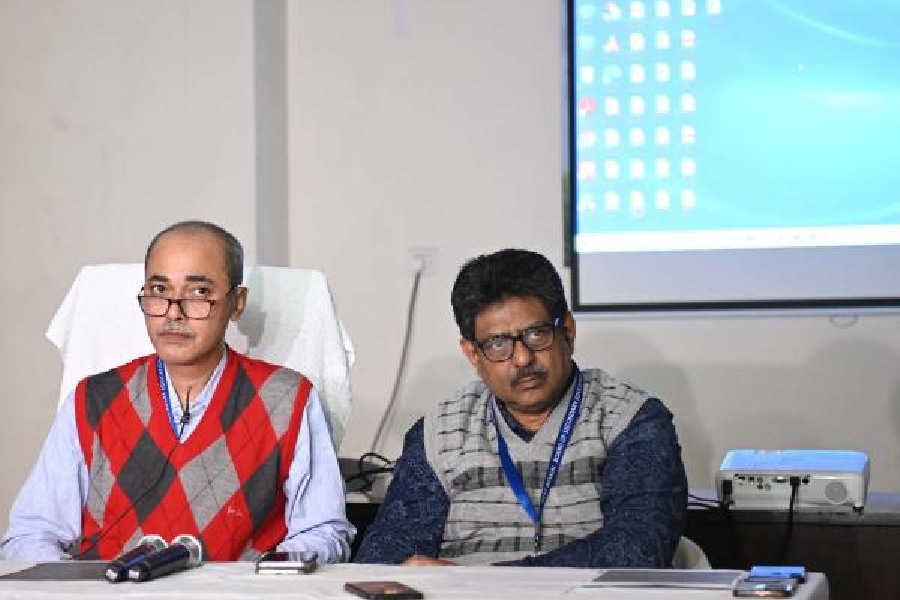A dozen state secondary board candidates were barred from writing their examinations any further on Saturday after WhatsApp images of question papers in circulation were traced to the codes on their papers.
The number of arrests was two on Friday, the first day of the Madhyamik examinations. The state secondary education board had expected the first day’s crackdown would act as a deterrent.
The large number of violations detected on the second day of Madhyamik made the board suspect a conspiracy was at play to malign the board and disrupt the exam process.
The board clarified that what happened on the first two days of the examinations did not amount to a paper leak.
Eleven candidates were caught from two centres in Malda district on Saturday. They had covered their QR codes with red ink so they could evade detection.
The board still tracked them down before the completion of the three-hour examination at 1pm.
A candidate in Jalpaiguri district was found guilty of sending the images of the question papers to his private tutor via WhatsApp, a board official said.
Board president Ramanuj Ganguly explained why he thought a conspiracy was at play.
“We informed you on Friday about the steps we have taken following the detection of candidates. Their entire examinations were cancelled. In spite of this, we saw what happened on Saturday. We think that it is no longer limited to some mischievous act of students. There is a motivated conspiracy. I am saying this based on the evidence that we have,” Ganguly told reporters at the board’s office.
“This is intended to malign the board and divert attention. It does not make us feel happy to cancel the examination of any candidate.”
This newspaper is not naming the schools or the students involves because they are minors.
In Malda, police said some of the students shared images of their question papers on a WhatsApp group soon after the exams commenced.
All of them have been detained, a senior district police officer said requesting that he should not be named because of the “sensitive nature of the case”.
A board official in Kolkata said that in Malda they had found evidence of a WhatsApp group which was linked to the circulation of the images of the question papers. “The eleven students who were barred from writing the exams on Saturday are members of the group. One of them is an administrator of the WhatsApp group,” he said.
The senior police officer in Malda said: “It seems they (the students) are associated with an organised racket. We have found a WhatsApp group which has over 150 members. We are trying to gather information about the other members of the group.”
An officer said that after the exam commenced on Saturday, a group of students appeared restless in the hall and were not writing their papers.
“Since their acts were found suspicious, those examinees were questioned by teachers. They were found to be carrying cellphones. The phones were seized and checked. Images of the question papers were found in the smartphones and the QR codes on the papers were crossed with red ink. They probably did so to hide their identities,” said the officer.
The school then alerted the police. “The attempt to conceal the QR code and links with the WhatsApp group suggest that it might be an organised conspiracy to malign the board and to challenge its authority in conducting the examination,” said a secondary board official.
Over the past few years, Madhyamik question papers have been circulated on social media within minutes of the commencement of an examination leaked from different venues. This prompted the board to introduce the QR codes. There are many such codes of each page of the question paper so an image cannot escape them.
“However, a section of the students continues to be desperate. We want the police to find out what made them do such a thing. Whether they do it out of enthusiasm or are paid for it, has to be found out,” the official added.
Two youths who were arrested near an examinations venue in Malda’s Englishbazar Block on the first day of Madhyamik for allegedly supplying answers to examinees are now in police custody.
“They have been taken into custody for seven days and are being questioned. So far, no commercial motive of those youths has been found. It appears that they were trying to help their acquaintances with answers,” said a police officer.
What happened on the first two days of Madhyamik makes it clear that the board lacks any effective mechanism that can prevent students from sneaking smartphones into their examination centres.
Ramanuj Ganguly said: “It is true that our teachers lack the expertise required to frisk candidates. We frisk on a limited scale. This is how we could prevent some candidates from sneaking in phones. Still, the detections inside halls show candidates are managing to enter with phones. We don’t know at this stage how we can prevent this.”
Asked whether they would take the help of tech experts, he said: “We would do whatever is required for the sake of a fair probe”.
He added:“I want to make it clear that what has happened over the first two days cannot be termed a question paper leak. Sections of the media said the secondary board question papers had been leaked. If someone purposefully circulates the images of question papers after the start of an examination, how can that be termed a leak?”
